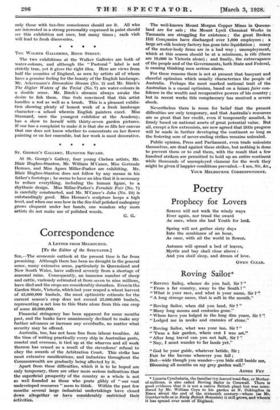Correspondence
A LETTER FROM MELBOURNE. [To the Editor of the SPECTATOR.]
Sra,—The economic outlook at the present time is far from promising. Although there has been no drought in the general sense, many extensive areas, particularly in Queensland and New South Wales, have suffered severely from a shortage of seasonal rains. Consequently, an immense number of sheep and cattle, variously estimated at from seven to nine millions, have died and the crops are considerably shrunken. Even in the Garden State, Victoria, which last year reaped a wheat harvest of 45,000,000 bushels, the most optimistic estimate for the current season's crop does not exceed 25,000,000 bushels, representing a net loss to this State alone from this one crop of some Z6,000,000.
Financial stringency has been apparent for some months past, and the banks have unanimously declined to make any further advances or increase any overdrafts, no matter what security may be offered.
Australia, too, has not been free from labour troubles. At the time of writing practically every ship in Australian ports, coastal and overseas, is tied up at the wharves and all work thereon has ceased as a result of the stevedores' refusal to' obey the awards of the Arbitration Court. This strike has most extensive ramifications, and industries throughout the Commonwealth are gradually being affected by it.
Apart from these difficulties, which it is to be hoped are only temporary, there are other more serious indications that the superficial prosperity of the country as a whole is not so well founded as those who prate glibly of " our vast =developed resources " seem to think. Within the past few months several large industrial undertakings have closed down altogether or have considerably restricted their activities. The well-known Mount Morgan Copper Mines in Queens- - land are for sale ; the Mount Lyell Chemical Works in Tasmania are struggling for existence ; the great Broken Hill Companies have discharged over 1,000 employees ; a large art-silk hosiery factory has gone into liquidation ; many of the motor-body firms are in a bad way ; unemployment, which at this season should be at a minimum, is rife (there are 10,000 in Victoria alone) ; and finally, the extravagance of the people and of the Governments, both State and Federal, is causing thinking men serious alarm.
For these reasons there is not at present that buoyant and cheerful optimism which usually characterizes the people of Australia. Perhaps the most marked national trait of the Australian is a casual optimism, based on a laissez faire con- fidence in the wealth and recuperative powers of his country ; but in recent weeks this complacency has received a severe shock.
Nevertheless there is room for belief that the present difficulties are only temporary, and that Australia's resources are so great that her credit, even if temporarily assailed, is firmly based on national assets of great potential value. But all, except a few extremists, are now agreed that little progress will be made in further developing the continent so long as the festering sore of never-ending strikes remains unhealed.
Public opinion, Press and Parliament, even trade unionists themselves, are dead against these strikes, but nothing is done to prevent them or to end them, with the result that a few hundred strikers are permitted to hold up an entire continent while thousands of unemployed clamour for the work they might be given if happier conditions prevailed.—I am, Sir, &c., YOUR MELBOURNE CORRESPONDENT.






























































 Previous page
Previous page